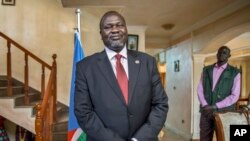As South Sudan's warring factions move towards a power-sharing government, rebel leader, Riek Machar, says his country has a lot to learn from Zimbabwe's coalition arrangement that ended in 2013.
Zimbabwe was thrown into political turmoil in 2008 following a disputed election, resulting in a negotiated unity government between President Robert Mugabe and opposition leader, Morgan Tsvangirai, who became prime minister.
Machar told VOA in an interview he’s prepared to work hard with his former boss and nemesis President Salva Kiir in trying to bring peace and stability to the war-torn country.
“We will learn from the mistakes made in Zimbabwe to ensure that we move forward in South Sudan,” he said without elaborating.
“We will for sure overcome the current difficulties and move forward and give our people the chance to live in peace and for political stability to return; for democracy to be consolidated in our country.”
South Sudan was plunged into civil war in December 2013 after a political row between President Kiir and Machar, his former deputy, reopened ethnic fault lines between Kiir's Dinka and Machar's Nuer people.
Machar promised in the interview that the warring factions will do their best to avoid guns as they try to settle differences and move the world’s newest nation towards development and stability.
“Some African leaders and personalities tell me that it was best we went to crisis before the dictatorship consolidated itself so I’m sure with this peace agreement, with a federal system, with institutional reforms, with accountability and justice being prioritized, we will create a more democratic state than any part of Africa,” he said.
The East African bloc IGAD, which is mediating peace talks between the warring factions in South Sudan, says the groups have violated the ceasefire agreement they signed to end the fighting over 50 times in the last 20 months.
Kiir and Machar signed a peace deal in August as international pressure piled on them and the threat of sanctions hoovered over their heads.
Both sides have accused one another of attacks.
“There are violations in the ceasefire, there are issues that are being raised left and right, we think we will overcome those and the peace agreement will be implemented,” Machar, who’s in the United States said.
“We want support from the United States to ensure that the activities – the 21 activities that we should do during the interim period (before the formation of the inclusive government); we only have 60 days to finalize those activities so we want support – resource support,” the rebel leader from the oil-rich country said.
At least more than 10,000 people have died in the conflict between Kiir and Machar with humanitarian groups being forced to pull out of certain areas due to heavy fighting.







